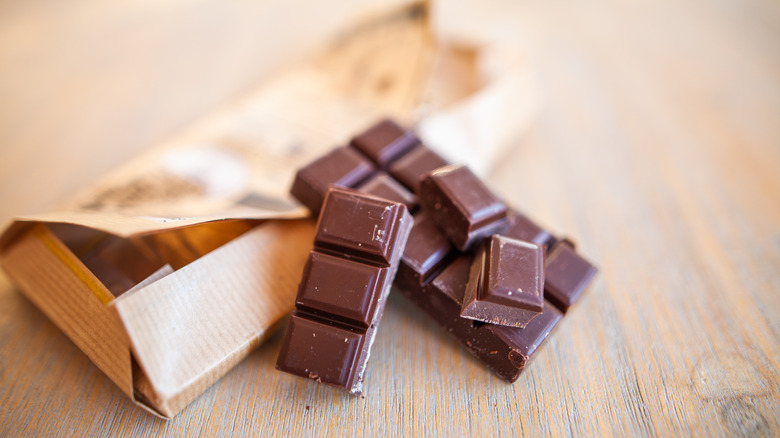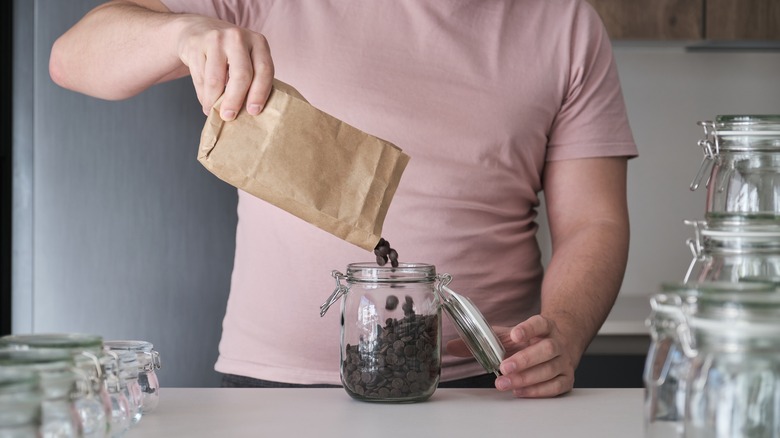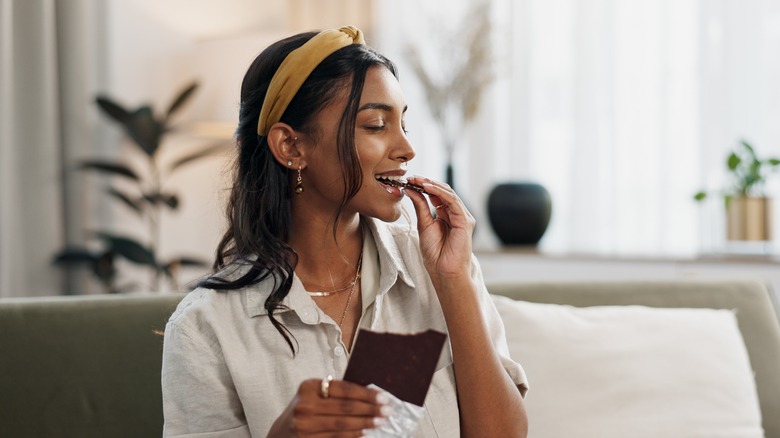Yes, There Is A Correct Way To Store Chocolate
For true chocolate lovers, the treat is its own food group and certainly a pantry staple you never want to find yourself without. Whether it's your night cap of choice to indulge in a square or two, or you always keep chips, chunks, or fèves on hand to whip up the perfect chocolate chip cookies, knowing how to store your chocolate for maximum enjoyment and lifespan is key. Though if you're a true chocolate fan, that bar or jar of bittersweet or semisweet chocolate chips probably isn't lasting long enough to have to worry about storage, it still pays to know how to keep the sweets creamy and fresh for as long as possible — and no, sticking a half-eaten bar back in the pantry with the wrapped loosely folded overtop doesn't cut it.
Humidity and temperature fluctuations are two of the primary culprits that damage all types of chocolate, slowly deteriorating its texture, appearance, and flavor. While chocolate is admittedly pretty resilient, always storing your treats in a dry cool area like a pantry or cupboard is by far your best bet to ward off unwanted changes. Keeping air out is also key, so be sure once you've broken into your delicious stash to store the remainder not just in the wrapper it came in, but in an airtight container like a ziplock bag or a mason jar with a well-fitting lid.
Oxygen and temperature swings are to be avoided
Obviously, leaving chocolate in a warm car is a no-no, but temps above 70 degrees Fahrenheit (and humidity above 55%) can also degrade chocolate's texture and appearance. Storing in a cool, dry pantry is best, but no one wants melted chocolate, so if the climate inside your home is routinely out of this range, the refrigerator is a good option. Just be sure to fully seal up chocolate so it doesn't absorb the odors and flavors of other food it's stashed near — as fatty cocoa butter is wont to do. When storing your chips, chunks, or bars in the pantry, be sure they're away from heat sources (like an oven), direct sunlight, and oxygen — all musts to ensure chocolate doesn't oxidize or melt, and preserve its delicious flavor.
In the rare event you won't be using up your chocolate anytime soon, the freezer is your best bet — since wasting any chocolate would be a crime. You can store an unopened bar, bag of chips, or essentially any style of chocolate in the freezer which will keep it as fresh as the day you bought it — for up to 18 months. When freezing, take baby steps to preserve its texture, first keeping the chocolate in the fridge for a day, then moving to the freezer. When it's time to eat, repeat these steps in reverse to slowly wake the treat back up without compromising texture or taste.
How long can properly stored chocolate last?
Wondering if that long-forgotten loot of Halloween candy in the back of the pantry is still good? In these cases, if the chocolate candy is still in an unopened wrapper, your jackpot is likely still very edible. Plain milk chocolate or dark chocolate (the type that lasts the longest, since it doesn't contain milk) can last for two years when stored properly. Chocolate treats with gooey centers like truffles, or candies laced with nuts or cream go bad quicker, in a couple of months usually, due to these extra ingredients. High-quality artisan or specialty-style chocolates made without preservatives should be eaten within a few weeks.
Regardless of the type of chocolate, use your senses — if it tastes or smells off, it is. Unlike other foods with strict eat-by dates where signs of decay and rot are obvious, chocolate in general will just slowly deteriorate in quality and flavor, if it's exposed to any of the above-mentioned triggers — light, oxygen, too hot or cold temps, or sudden temperature changes. However, if you've ever noticed a white dusty substance on your chocolate, this is a totally harmless (just unsightly!) "bloom," and your treat is still safe to enjoy. Avoid these blooms, caused by moisture or temperature fluctuations, by storing properly, or just eating it up quickly — though we doubt we need to tell you that.


